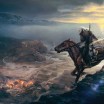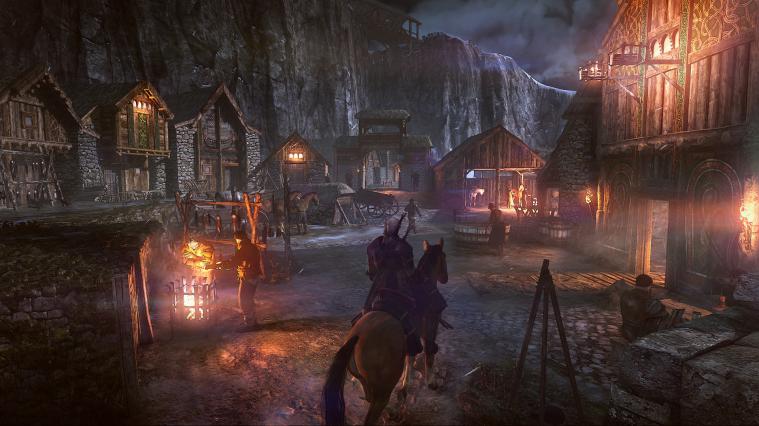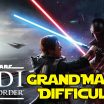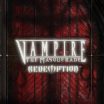At a Glance – The Witcher 3: Wild Hunt

The Last Hunt?
“There will be 36 different endings,” said Adam Badowski, managing director of CD Projekt RED. To which his compatriot, Head of Marketing Michal Platkow-Gilewski, quickly corrected to “Thirty-six different world states.”
Such is the promise that CD Projekt’s own development crew is making on the third, and supposedly last, entry into the phenomenally successful (and mature) world of Andrzej Sapkowski’s Witcher universe. “We believe that we should end the series on a high note,” says Badowski. “Technology has progressed to where we can finally tell the story the way we want, with the visuals we want, in the world we imagined…we believe it’s time for us to look to new worlds and new horizons to keep pushing the boundaries of what we can create.”
That creation includes an extremely open world design. One that, according to CD Projekt, is currently at war. Hinted at at the end of The Witcher 2, how Geralt reacts to it, and what he intends to do about it, both on a great and small scale, is being entirely left up to you. “War will be present – maybe not at every single step, but almost everywhere – in different ways, depending on how far from the actual fighting, the front lines, you might be,” Platkow-Gilewski says. “It depends on who you talk to. Maybe a small community will have other problems on their hands apart from the war, which is far away…….Depending on the region, you’ll see other effects of the war. When you’re traveling through the open world, you’ll see places just after the armies have marched through. Places destroyed by the war. In different places you’ll see people talking about the war as a chance to maybe gain some wealth.”
And staying true to the open world nature, CD Projekt Senior Quest Designer Jakub Rokosz say that however you want to deal with this world is being entirely left up to you. “To be honest, we always loved the narrative part of the Witcher series,” he says. “We really like the way we tell the story. But we always felt that we were restricted by the way we allowed the player to travel to locations. They were always small, closed locations. We knew that if we wanted to give you the feeling of Geralt searching for his meaning and knowing the world, this wouldn’t work. The open world was the only right approach for this, to be honest. Geralt, right now, after two games and restoring his memory and stuff, I think he needs to find himself again. This is part of his journey as well.”
Platkow-Gilewski echoes this sentiment, saying that this non-linearity is what makes RPGs memorable. To take on the story at their leisure, without it feeling forced on you, or rushed, or that there’s some unseen time limit event you need to tick off your “quests completed” checklist. “I don’t believe in a structure like A-B-C-D-E-F-G, you’re finished,” he says. “The main storyline needs to be connected with everything that’s going on in the world, to a bigger and smaller extent. Of course, you [could] just go out to somewhere in the woods, in the wilderness, and you can focus on monster-hunting. Maybe you as a gamer just love to hunt monsters, like the Witchers are supposed to do. You can focus on the undead if you want. So you can do whatever you want. For me, this is the definition of an RPG. Do whatever you want.”
To shore up personal player/universe consistency, CD Projekt is currently working out some way to transfer your personal decisions from previous games. Though how this will work is still up in the air. “We are going to give you a possibility to use your save from The Witcher 2,” Badowski says, “but it will depend on the platform. On the Sony platform we are developing the game for the first time, so we invented a way to define your old actions and decisions. f you decide to play on the PS4 and played on PC previous, you probably want to have continuation, you want to have a similar character.” Beyond that, Badowski said they are “experimenting” with implementation and will reveal more on their progress closer to Witcher 3’s release.
Instead, CD Projekt is focusing on telling a more personal story between Geralt and the player. One that Lead Quest Designer Meteusz Tomaszkiewicz says is the biggest point of interest in game. “Geralt has changed his priorities,” says Meteusz. “He has regained his memory, so he remembers that he had a family once, he wants to find his long lost love – Yennifer, the sorceress. He doesn’t care about politics any more – even less than in previous games.” Oh, but don’t worry. For those who enjoy a little Game of Thrones/political intrigue in their open world RPG, it’s still there. It simply won’t be the driving element in Geralt’s life now. “There will be moments where Geralt will get involved in [political] things, but this time we have divided the plotlines of The Witcher 3 into a few categories,” Meteusz says. “The first category is the basic main storyline of the character, of Geralt – looking for his Yennifer, amongst much else. This is the plot that is very personal to Geralt, and this is the main driving force for the entire game.”
Another element CD is looking to refine is the power of Geralt himself. Being a Witcher, a monster hunter at heart, should you decide to track and hunt and kill them, expect Geralt to have to do considerably more detective work before he can even begin the sword-slinging fun. “We thought ‘what we could do to make Geralt and the player feel more like a monster hunter?'” expands Meteusz. “We thought that we should incorporate an investigation part in each monster hunt – you have to gather clues about what is the monster that is troubling the village, what it is that’s hunting people around here, what are the habits of this monster, how should I fight it, how should I prepare for this encounter? We have this new mechanic that we call Witcher Senses, which is supporting this – Witcher Senses is an ability, a skill that you can use during gameplay, that helps you find different clues and track monsters. And this is something we are putting a big emphasis on in The Witcher 3.”
This sense, CD says, is not only limited to hunting monsters, but to give Geralt a sort of sixth-sense or “leg up” on certain situations he might not have the first clue about. “Further in, sometimes, in some situations, you’ll be able to predict or judge what might have just happened,” Platkow-Gilewski says. “You’ll see small, simple animations showing what happened in a place. For example, if you see a body that’s been murdered somehow, with these skills you can see some of what happened – how the guy died. Other uses… If you enter a deep, deep wood…. and you can’t see anything, with the Witcher senses you can hear more. You can hear something from one direction or another, and when you walk toward that direction you might find it. Maybe a monster. This is part of the set of tools that will help you feel that you’re the Witcher – not only human, but something more.”
Reputation, as we all know, is everything. And in the Witcher 3, reputation can impact the very course of battle. “While you’re fighting with enemies, human enemies, they have a morale system,” Platkow-Gilewski says. “If you’re strong enough and they feel like they’re losing – like if they outnumbered you at the beginning, but now there’s only one of them still alive – they’ll start to go on defense. They’ll be afraid of your swings. Then, ultimately, they’ll surrender. When they surrender, you can either finish them or leave them alive. You can take their loot any time you want.”
And while showing mercy might make you feel better, Platkow-Gilewski warns that might come back to haunt you later on. “If you’re just fighting small-time bandits somewhere in the deep woods, maybe it will have no influence on the world. But maybe something will happen. We’ll see. Those bandits might do something later on. Maybe they’ll kill a shepherd. It depends on the situation, of course. If it’s an important moment in the storyline, it will have significant influence on everything like [what was] in The Witcher 2.”
Senior Quest Designer Jakub Rokosz says that you can expect “…. the main story [to] cover around 50 hours. Other quests, filling the gaps, that’s probably another 50 hours of content. Then there’s a lot of other gameplay quests. But… we don’t want to make anything linear. Where we can get away with not making it linear, we’ll do it.” “The game is quite complex,” Badowski said. “We didn’t mean to develop something special for the endings, it’s a natural consequence of the story line. The story has hundreds of different branches and sub plots. We have to just sum all of those elements up in the epilogues. Some of those elements are taken from the very beginning and some from other moments of the storyline. All of them will connect in the epilogue. We have a lot of things to summarize. We didn’t spend time on inventing endings, it was just the consequence of those choices.”
This might all seem like a tall order, even for CD Projekt Red. But don’t worry, they plan on taking their time making sure everything connects, everything makes sense, and everything is properly dealt with by the end of the game. “To be honest, the ending for us, the epilogue, it should just be the cherry on top of all your consequences and how you wanted the world to change,” Rokosz says. “I don’t know if there’s anything like a bad ending or a good ending. It’s just the way you played. If you don’t like it, just play it again.”
“And,” he adds with a chuckle and a not too subtle jab at another famous (or infamous) developer, “We don’t have multiple colors of endings in our game.”
The Witcher 3: Wild Hunt is currently on track for a February 2015 release for the PlayStation 4, Xbox One, and Microsoft Windows.
Get ready for a Wild Ride.












Leave a Reply